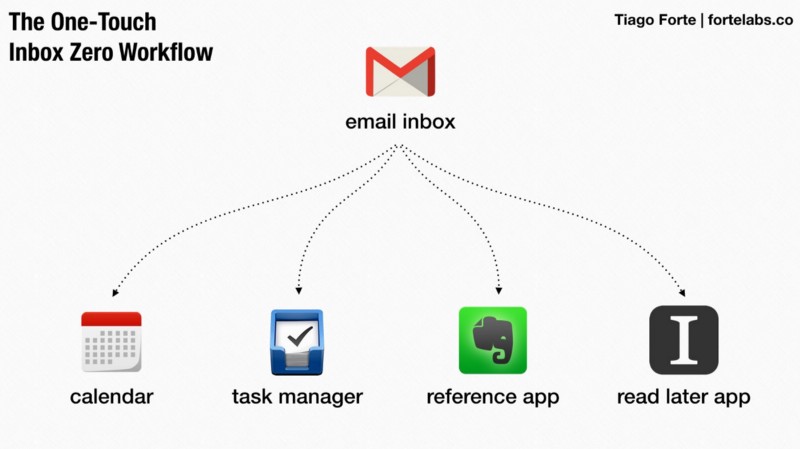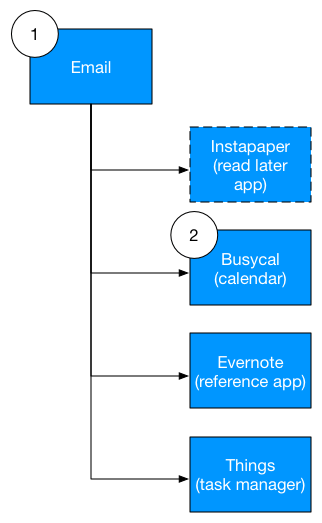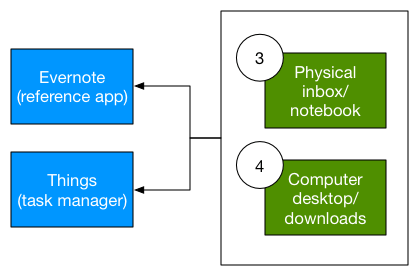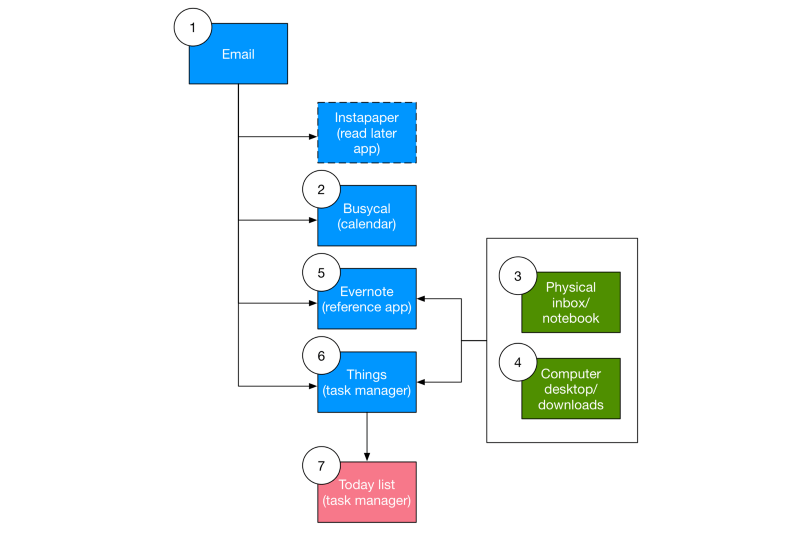
In his book Getting Things Done, David Allen calls the Weekly Review the “Master Key to GTD.” He claims it is the single most critical habit one must adopt to capture open loops, manage commitments on an ongoing basis, and maintain a “mind like water.”
Yet it is also the most difficult habit to maintain. Allen has noted and I have seen many times in my own work, that even dedicated GTD practitioners have trouble maintaining the cadence of weekly check-ins at a higher horizon.
I think I know why, based on my experience with habit formation: weekly habits exist on an unstable middle ground. They happen frequently enough to be lynchpins in your weekly productivity, yet not often enough to be natural habits in your daily productivity. They are too consistent to fall into the “opportunistic, when needed” bucket, yet not consistent enough to fall into the “daily routine” bucket. They take long enough to require dedicated focus, yet not long enough that it would make sense to dedicate a full cycle.
This instability creates an intense cognitive dissonance around Weekly Reviews — we know we should get good at this practice, and yet we also feel in our bones it is not worth the effort required. It becomes an exercise in stoic determination, sticking to the plan in hopes of uncertain future rewards.
I think a good model for thinking of the Weekly Review is as an operating system. It is the backbone of everything else that happens during your week; the master program on which all other programs run; the environment that creates the context for hundreds of small decisions and behaviors.
Designing operating systems is also one of the most challenging feats in the software business.
In my trainings and courses, I attempt to create a supportive environment where people feel safe enough to attempt to design their own. This is where the real learning begins. I know someone is ready to be their own Workflow Designer when they start challenging my rules and prescriptions with well-reasoned principles of their own.
I’ve spent a tremendous amount of time and energy testing and tweaking and thinking about my own weekly review, and I’d like to take you through it here. It is deceptively simple, and not necessarily right for everyone. But its simplicity illustrates the Weekly Review’s real potential once you get it nailed down: to free up time, attention, stress, and overwhelm far out of proportion to the time it takes.
Here is the checklist, which I keep in a little yellow stickie note on my desktop:
So humble. So unassuming, isn’t it?
But this short checklist represents something very meaningful to me: the ability to go from total chaos to total clarity in 15–30 minutes. It can handle any type of information, from any source, in any quantity, over any period of time. It doesn’t matter if I’m checking in after a couple calm days of work, or returning from 3 weeks of vacation. I follow the same steps in the same order. I’ve put enough design thinking into it that, in the moment, I trust that all open loops will be appropriately handled. This confidence produces an almost meditative state as I proceed through the list one item at a time.
Let’s walk through the checklist step by step.
TIAGO’S WEEKLY REVIEW
Part I: Emergency Triage
☐ 1. CLEAR EMAIL INBOX
I start with email, because no other decision I make will be correct without the latest information. There is a risk here — that the sheer quantity and urgency of my emails will throw me straight into the vortex, drowning me in adrenaline. That’s why I follow One-Touch to Inbox Zero, starting with the oldest email and making a decision about where to send each one: to 1) my calendar app, Busycal 2) my task manager, Things 3) my reference app, Evernote or 4) my read later app, Instapaper. I’m not doing anything, just deciding what needs to be done.
☐ 2. CHECK CALENDAR (-2/+4 WEEKS)
The next item is the calendar, since I want to know what the hard landscape of my day and week looks like as early in the day as possible. Nothing too unconventional here: I put down any new commitments, and review existing ones to get a sense of the week. My rule of thumb is to look two weeks into the past, for anything I need to follow up on, and 4 weeks into the future, for anything I need to start preparing for.
These first two items make up Part I of my review, making sure there’s no emergencies and laying the foundation for what comes after:
Part II: Preventative Maintenance
☐ 3. CLEAR PHYSICAL INBOX/NOTEBOOK
Next, I go through any mail or other papers that have accumulated in my physical inbox. Any new commitments I add to my calendar, new reference material to Evernote, and new open loops to Things. And I’m sure to throw away, file, or shred everything as soon as it’s appropriately captured.
I also review my paper notebook, capturing any open loops in my task manager, taking photos of any pages I want to keep using the Evernote app, and drawing a diagonal line from one corner of the page to the other to show that it’s been captured.
☐ 4. CLEAR COMPUTER DESKTOP/DOWNLOADS
Then I do the equivalent for my digital piles. Somehow, over the course of the week my desktop has invariably become a morass of random files of unknown origin. For each file, I either trash it, put it in my computer’s file system (following P.A.R.A.), add it to Evernote, and/or capture it as an open loop.
I do the same for my downloads folder, sorting them into the same locations as above and then emptying the trash with a satisfying “whoosh.”
Part II is about getting all your workspaces clean, removing the clutter that stresses you out, making sure nothing is falling through the cracks, and putting open loops to rest. It might seem unimportant to clear these places so religiously, but I’ve found that left untended they become unmanageable at the worst possible times.
☐ CHECK MINT TRANSACTIONS
This is just a random thing I like to do, to categorize new transactions, make sure I’m not getting charged for anything I didn’t buy, and reviewing my budgets to make sure I’m not overspending. It’s also an example of how really any habit or behavior can be scheduled to happen on a regular basis, by “linking” it into your Weekly Review.
Part III: Planning Action
☐ 5. PROCESS EVERNOTE INBOX
By this time, there is a lot of stuff in the Evernote inbox. Not only notes I’ve accumulated over the course of the week, but notes I’ve gathered over the previous 4 steps: from email, my calendar, my physical piles, and digital piles. A typical number is between 30–50 new notes, which I file in my P.A.R.A. notebooks.
This step also serves as a helpful reminder of things I captured during the week, that I may want to be reminded of or take action on.
☐ 6A. PRIORITIZE AND FILE NEW OPEN LOOPS
By this time, my Things inbox is overflowing with new open loops I’ve captured, typically also between 30–50 each week. I batch process these all at once, clarifying for each one what it is, what it means to me, what the next action is, what priority or context it is, and which project or area it fits into. That may seem like a lot of decisions, but using keyboard shortcuts and doing them all at once, it takes minutes.
☐ 6B. REVIEW WAITING FOR LIST FOR FOLLOWUP
I’ve found over the years that simply following up with people is one of the easiest ways to get what I want or need. I begin any task that I’m waiting for someone on with “waiting for: [what I’m waiting on them for]”, so I can quickly call up all my followup tasks across all projects with one search, even if I’m on the go.
☐ 7. CHOOSE TODAY TASKS
This is the moment we’ve been waiting for. I start with urgency — sorting my tasks by priority across all projects, and moving the ones I absolutely must complete today to the Today section of Things.
Then I move to importance — looking only at the 2 or 3 projects I’m most focused on this week, ordering them approximately from earliest to latest, and moving the top few to the Today section.
What I’m left with after Part III is a concise, clearly formulated, prioritized, sequenced list of next actions for the day, grouped by project and available at a glance on my mobile device. I don’t have to do any more meta-thinking after this— my intellectual horsepower is dedicated to creating value, not keeping balls in the air.
Consider the amount of thinking that is informing this decision:
- Your email inbox is completely empty, with all next actions extracted into your task manager
- Your week’s calendar is fresh in your mind, both hard and soft commitments
- All open loops are captured and clarified, from the most urgent to least important
- All the piles and accumulated documents are filed away, ready and waiting in their project folders
- All your ideas, insights, and random musings are captured and waiting in your Evernote notebooks, leaving your mind a blank slate
Selecting your tasks for the day is a simple decision, but it’s the simplicity on the other side of complexity, made with awareness and balance and full information, not a reaction to the demands of the moment.
My Weekly Review workflow
CADENCE AND SYNCHRONIZATION
The book Principles of Product Development Flow gives an example of how cadence (the use of a regular, predictable rhythm within a process) can be used effectively.
Waiting for the bus, you may have noticed that sometimes two buses arrive in quick succession, followed by a long period with no buses at all. Even when they leave the station at precise intervals, eventually they will get all bunched up. This happens when the schedule amplifies the effects of variability. When the first bus encounters a lot of passengers at a stop, it takes longer to load. This delay causes more passengers to build up at the stops ahead, slowing it down further. The bus behind it encounters fewer and fewer passengers, and soon catches up with the first bus.
The solution is well known: to schedule specific departures for each bus at each stop. When the second bus arrives at a stop, even if there are no passengers, it waits until its scheduled departure, to avoid overloading the one that comes after it. We want to constantly resynchronize the buses to the cadence of their schedule, preventing fluctuations from accumulating, not to mention creating a more predictable experience for riders.
Skipping my Weekly Review, I’ve found, is much like throwing the bus schedule out the window. Don’t get me wrong — the buses still come. I continue to get things done, making me think I can do without this ritual.
But beneath the surface, the fluctuations are accumulating. A file lost in my downloads folder that I promised to send to a client is ticking like a time bomb. The deadline to buy tickets to a conference, dutifully captured in my task manager inbox but never scheduled on the calendar, is looming like a silent killer. A brilliant idea I saved to my Evernote inbox goes undiscovered when I most need it, like that funky smell in the back of the fridge.
Here’s the issue: the fluctuations only become obvious when they break through the surface, when everything seems to break at once, which usually happens at the worst possible moment. Like the car that breaks down on the highway during a long road trip, your systems collapse exactly when you most need them to support you, during periods of maximum stress.
By this time, things are so out of control and painful that we go into crisis-response mode, doing whatever it takes to bring our life back into its cadence. But this makes it difficult to trace cause-and-effect: how could a little ol’ weekly review prevent something so catastrophic? A single one cannot, but a series of them can.
Your Weekly Review is your scheduled departure from chaos back into order. It is your appointment with all your various selves, each tasked to ponder and monitor and track and evaluate different areas of your life, to regroup and share notes. It is the referee whistle blowing a time out, giving you the chance to resynchronize the many threads running at different time scales, different speeds, foreground and background, professional and personal, important and urgent. It is your time to purge the low-level thinking that clogs your synapses in one fell swoop, leaving your mind free for expansive intuition the rest of the time.
But the trick is to design one that fits seamlessly into your life, that represents your goals and aspirations and values, not your perfectionistic impulses. The Weekly Review is a master key, but each lock is different. It is worth spending the time to design a key that matches yours.
When is yours scheduled?
The Only Subscription
You Need to
Stay at the
Edge of AI
The essential toolkit for those shaping the future
"This might be the best value you
can get from an AI subscription."
- Jay S.
Join 100,000+ leaders, builders, and innovators

Email address
Already have an account? Sign in
What is included in a subscription?
Daily insights from AI pioneers + early access to powerful AI tools












Comments
Don't have an account? Sign up!